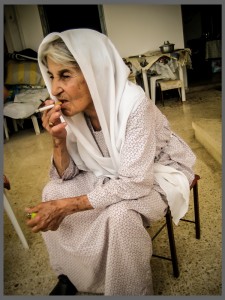Volume 14:2, Spring 2013
HERRING HIGHWAY
In the swamp in secluded recesses,
A shy and hidden bird is warbling a song.
Walt Whitman
Henry, there is a spot in Rock Creek Park
called Herring Highway, where you cant see
the city and the city cant see you, where the herring
come up once a year, swimming upstream,
and every year the Bucket Brigade waits for them
to scoop them by the hundreds and carry them
over the fords upriver. Every time that I pass this spot
I think of where you left off and where we keep returning,
where you stopped and where we are still compelled
to go and I wonder: were we the benevolent Brigade
or the hard-headed herring?
In this city, ever more stagnant, we felt like we were
the only thing moving. And as everything we know disappeared
we kept trying to retrieve it. We are now strangers here Henry,
in this city of empty balconies and soulless lights. If you could
only see what has become of your city, the nothingness
spreading through it. The nothingness that straightens out all the curves,
rusts all that is rustic, dulls all texture, sanitizes all that is pungent.
We see it everywhere, as we expected it everywhere,
in the streets of my birth, in the streets of your birth,
in our exile, and in the exile from our exile. Every morning
I look out of my window to these last strongholds of desperation,
these amphitheaters of pain, and wait for someone to remember
that this swamp moved once, before it became still again,
to recognize what has died and declare it to the street, to set things
off , as Stokely did in 68, as the Latinos in 92,
as your sister did when she viewed your body.

Photo: Rayan El-Amine, 2008
A FLYOVER DEIR KEIFA
The siesta breeze
paces up and down the staircase,
from balcony to courtyard,
courtyard to balcony.
It enters our room,
washes over our faces,
hops from brother to brother,
cousin to cousin,
points out all the open windows,
teases us with all the birds
mocking from the trees.
It crawls over aunt Walade
who lies sprawled across her futon,
after we had walked on her back,
half-covered in a quilt,
happy-face down,
as we had left her.
It kneels before Sittus bed,
watches her direct the vines,
keep the bees honed to their hive,
and ward off the snakes from our land.
It rises up to aunt Sharifes high bed
where she drowns in her Valium sleep
and her restless dreams
of all the chores
she should be doing.
It pours out of the back door
to be tossed about with the afternoon chicken chatter
and rises with the sorrowful braying
of Abu Alis donkey.
But it disperses before Deir Keifas clouds,
dug in the open pastures
of Deir Keifas defenseless sky,
shivering in their southward watch
to the roar of approaching phantoms.
EMBASSY ROW
A day all done by Almodóvar I say.
Spilled Wisteria over a wrought iron veranda,
blooming vines arched over a doorway,
the weeping cherry tree with the parachuting
blossoms. And me, unbound, the other Sheida,
the one with spaghetti straps, Onassis sunglasses,
low-cut jeans, a bare midriff.
When we approach a magnolia,
in its early spring glory, petals like
washed up seashells, some cupped
up and some cupped down, I hop
and skip to it, recite Rumi in breathfulls
of Farsi until I choke on the April air,
until I surrender to the rapture, collapse
like a marionette, hands overhead.
Here the leaves strobe the sun,
one moment I am a woman in rapture
the second I am a beached mermaid,
hair arranged by retreating waters, stranded
seashells all around, another, and I am
a fallen angel, mauve feathers asunder,
pinned in Gods blinding glare.
MOTOR CITY
Across from the Hope of Christ Church
the Motor City building streams with neon
still promising redemption. Before us
a vast garden, brimming with vegetables,
bordered by the salvages of an abandoned promise:
wrought iron weaving, peeling doors, stained
glass windows and revelers in torch light.
A friend plays guitar, another rolls
a joint, another slurs a bawdy song.
When I drive you home on yet another
MLK Boulevard, you leave a cigarette
on the dashboard before you kiss
me goodnight. I drive back across MLK
blowing smoke out the window,
right back at Motor City.
MUSTAPHA SA’EED IS ALIVE AND WELL
No, Mustapha Saeed has not left the building.
He did not drown himself at that bend
in the Nile, during the floods. He did not string
himself up in his pharaonic tomb of a library
he was not speaking of the afterlife when he spoke
of heeding the call of faraway horizons. He packed
his books, his ostrich feathers, his sandalwood,
and snuck out the back when you were not
looking. He did not go back to that deflated
empire of the U.K., he went to roost in the burgeoning one
the U.S. of A. He has settled in your home, in your school,
in your mind. He has become your aerobics instructor.
He is your childrens French tutor.
He is a member of your knitting circle.
He is the one standing behind your wife in Yoga Class.
Zein El-Amine was born and raised in Lebanon. He has an MFA in Poetry from the University of Maryland where he teaches classes on Arabic language and culture. His poems have been published by Wild River Review, Folio, Split this Rock (featured poem of the week), Foreign Policy in Focus, and DC Poets Against the War: An Anthology. His short stories have been published by Boundoff and Uno Mas magazines. El-Amine lives in the Columbia Heights neighborhood of DC and is a member of the Ella Jo Baker Housing Cooperative. To read more by this author: Zein El-Amine: Wartime Issue Zein El-Amine: Mapping the City